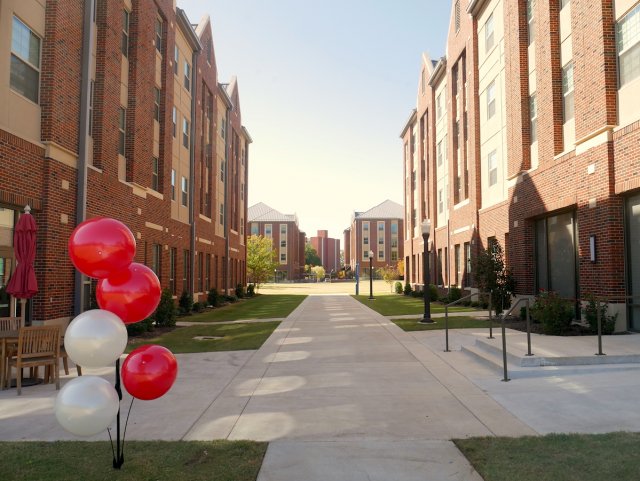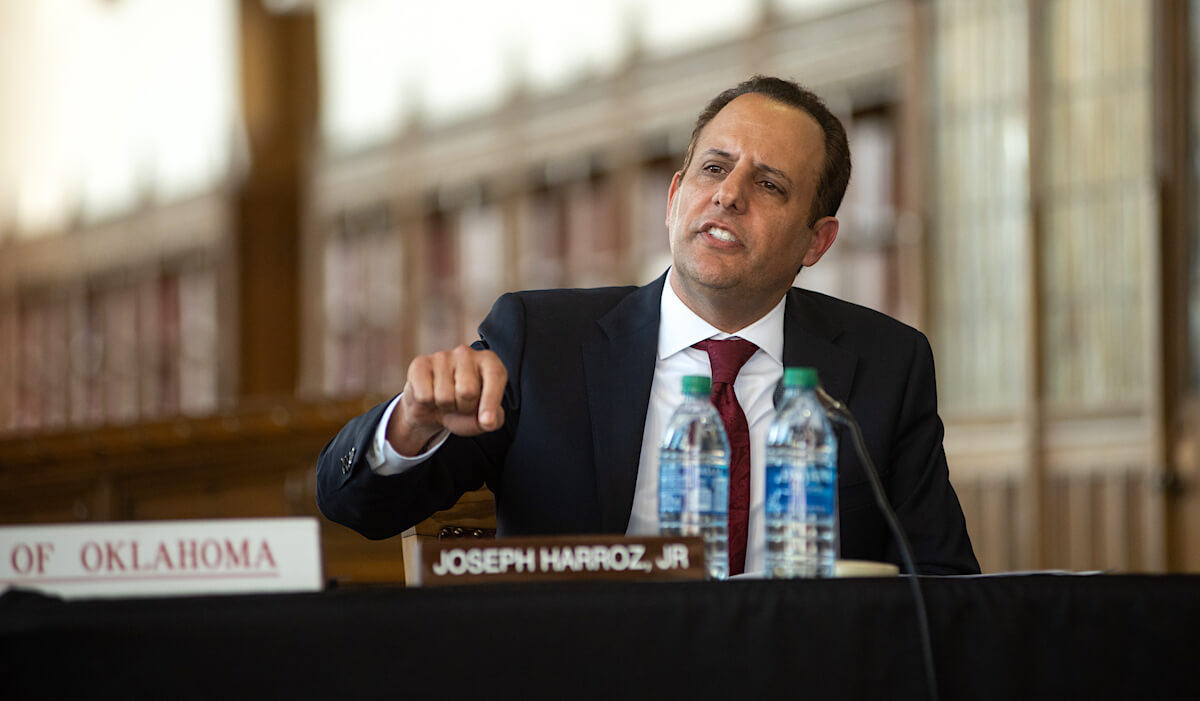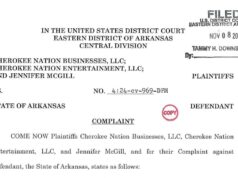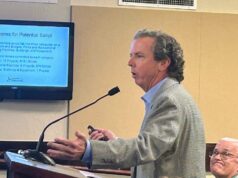

(Update: Around 3:45 p.m. Thursday, May 27, the University of Oklahoma Board of Regents approved the settlement agreement and buyback plan for the Cross Village housing project described below. In December 2021, OU finalized a bond package and subsequent sale agreement to buy Cross Village back from Sovereign Properties Holdco for $180 million. The following article remains in its original form.)
When First Bethany Bank & Trust President Priscilla Cude bought $500,000 worth of bonds in 2017 to help finance the University of Oklahoma’s controversial $251.7 million Cross Village housing project, she thought she was simultaneously supporting her alma mater and making an investment for her customers that would yield substantial interest returns over the next decade.
Fast forward four years, and Cude and others are irritatedly watching as OU’s Board of Regents prepares at 2:30 p.m. Thursday to approve an unusual settlement agreement that will cost her bank $150,000 and tee the Cross Village project up for an extraordinary next chapter that Cude says “is just unheard of” in the financial world.
“This is a huge black eye,” Cude said. “This whole deal got settled fast without [many] bondholders even getting a notice of it. They took two mutual funds that had about 51 percent, and they settled the whole deal, and nobody else even heard about it.”
Cude is not alone. Terry Thomas, whose family owns American Exchange Bank in Lindsay and Fletcher, said he has been calling his state legislators trying to alert them to what he calls “outright fraud” by the university.
“It does appear from what we’re learning that OU is basically intending to defraud the holders of these bonds by repurchasing this housing development after the Chickasaws purchase it at a 27 percent discount, which is just an outright fraud against the bondholders,” Thomas said. “I don’t think the residents of Oklahoma or even the Legislature knows what is taking place. (…) I would just plead that the regents would reconsider this action.”
The Cross Village situation is complicated and unusual, with numerous details relevant to its understanding:
- In 2017, OU struck a public-private partnership with a nonprofit called Provident Oklahoma Education Resources to build the 1,200-unit Cross Village complex (also designed to feature ground-floor retail) and a covered parking garage on land owned by OU, just south of its existing three tower dormitories, Adams, Couch and Walker.
- At the behest of OU and Provident, the Oklahoma Development Finance Authority — a non-appropriated conduit bonding agency — issued and sold two series of bonds totaling $251.7 million with staggered maturity dates between at least 2025 and 2056.
- Then-OU President David Boren’s administration orchestrated the deal, pledging to lease Cross Village retail spaces and the parking garage back from Provident for about $7 million per year. Owing to state law, however, those leases could only run on a year-to-year basis, not a multi-year agreement.
- Shortly before the public-private partnership was finalized, Boren’s administration asked that Provident provide OU with a $20 million cash payment up front as part of the project.
- When the Cross Village complex opened, it received far less interest from students than had been predicted. In 2018, bondholders learned on a conference call with OU administrators that the anticipated 96 percent occupancy rate was really closer to 30 percent.
- When Boren stepped down as president and was succeeded by Jim Gallogly, the new president announced he was gravely concerned about OU’s finances. Cross Village stood as a prime example, and Gallogly declined to renew the $7 million retail and parking leases because they did not reflect market prices.
- The bonds fell in value dramatically, earning a “junk” rating. Provident alleged OU made a “material misrepresentation” that could be a securities violation, and the organization sued the university.
- In conjunction with Provident and at least 51 percent of the bondholders, the OU Board of Regents will consider approving a proposed settlement agreement during its Thursday meeting that involves a third party — Sovereign Properties Holdco, LLC, a wholly owned business subsidiary of the Chickasaw Nation formed in 2012 — buying the Cross Village complex for $180 million.
- Under a separate agreement between OU and Sovereign Properties Holdco, the university will lease and eventually buy back the Cross Village properties also for $180 million, which will be financed by OU issuing another set of bonds.
Harroz: ‘All of it is resolved’

With the proposed settlement agreement netting investors only $180 million for the $251.7 million in bonds that were sold, bondholders will only receive roughly $0.72 per $1, a situation that rubs Cude the wrong way.
“They’ve just kind of swindled the bondholders out of this deal,” Cude said. “And then they work out a deal on the side where they are going to lease that project for the same purpose. This thing was a $251 million project, and for the lease they got $20 million up front, which is pretty unusual, and they kept the money.”
Asked if OU would be returning the $20 million it received up front from Provident for the project in 2017, current OU President Joe Harroz said the university would be revealing the specifics soon.
“I know this much, and that is that all of it is resolved,” Harroz said. “That is not a separate issue. That is included in the global resolution.”
Kesha Keith, OU’s director of media relations, said OU “has not paid and is not paying” any money to Provident in the settlement, “including the $20 million upfront lease payment it received when the project commenced.”
She added that the terms of how OU will lease and ultimately buy the property from Sovereign Properties Holdco “are being finalized.” It’s unclear whether those details will be revealed during the OU Board of Regents meetings 2:30 p.m. Thursday and 8 a.m. Friday at the OUHSC Robert M. Byrd Library.
“The university and Sovereign Properties Holdco, LLC (‘Sovereign Holdco’) the designee of the Chickasaw Nation are entering a lease agreement in which the university will operate and manage Cross Village until the university obtains funding to purchase Cross Village,” Keith said. “The lease ‘details/terms’ are being finalized. However, Sovereign Holdco/Chickasaw Nation has agreed to sell its right in and to Cross Village, subject to mutually agreeable lease terms and conditions, to the university for $180 million.”
Keith said “the university will use bond proceeds to fund the purchase price” from Sovereign Properties Holdco.
More bonds, but impact on interest?

In March, the OU Board of Regents requested authorization to issue up to $185 million in new housing bonds. State law required Harroz to send a letter to House Speaker Charles McCall (R-Atoka), Senate President Pro Tempore Greg Treat (R-OKC) and Gov. Kevin Stitt detailing the request, which would be approved unless the Legislature specifically disapproved it by April 22.
In the March 8 letter (embedded below), Harroz wrote that OU would be issuing up to $185 million in bonds “in the next nine months in support of student housing infrastructure located at the University of Oklahoma’s Norman campus.”
“The bond contemplated herein will be secured by a pledge of all lawfully available sources of revenue other than revenues appropriated by the Legislature from tax receipts, which will result in a higher credit rating, lower costs of issuance and interest savings,” Harroz wrote.
But several people with extensive experience in the bond-selling market speaking on the record and on background have told NonDoc that OU could pay a price — such as a slightly higher interest rate — for its new housing bonds owing to industry frustration over the first round of Cross Village bonds.
“I won’t buy any. I can tell you that,” Cude said. “I would think there are a lot of mutual fund companies that own a whole lot more of these bonds than I do that aren’t going to look very favorably on it, mainly because they didn’t even try to renegotiate the deal with the bondholders. They negotiated with this third party who came in and bought it.”
Speaking on the condition of anonymity because of the situation’s ongoing nature, a national bond-market expert familiar with the Cross Village situation said OU’s financial reputation has been damaged by the debacle.
“It’s been said more than once by many, many people in the investment community that the university has acted appallingly here,” the individual said.
An OU graduate whose husband and children are also alumni, Cude said she has spoken to “several other” national bond brokers about the situation.
“They think it’s unheard of that the bondholders didn’t have any other notice,” she said. “But probably they didn’t because there would be enough people who said ‘No,’ and they didn’t want to go through all that.”
Thomas, whose bank owns Cross Village bonds at both of its branches, concurred.
“This bank will never purchase another OU bond after this takes place, and I think the OU regents should certainly consider the ramifications of their actions if they do this,” said Thomas, whose wife and son are OU graduates. “I can’t imagine anybody in Oklahoma wanting to purchase bonds from the University of Oklahoma. (…) They’re basically just swindling the bondholders out of about 27 percent of their value.”
Mike Davis, president of the Oklahoma Development Finance Authority, which helped issue the bonds for Provident in 2017, said his office has not received calls from bondholders about the issue, although he said he knew the situation has been sitting poorly with some.
“I think that’s clear that there are frustrations, and I think everybody recognizes that,” Davis said.
But Davis said OU’s upcoming bond issuance should benefit from what has been a prime market in 2021.
“They are entering the market at a time when things are pretty good,” Davis said, noting that OU faired well with a bond refinancing around the turn of the year. “The market decides.”
He noted that OU’s next housing bond issue will be backed by general revenue instead of the lease revenue bonds issued in 2017.
“Keep in mind, the university was not financially obligated to repay those (Cross Village) bonds. That was Provident,” he said.
Follow @NonDocMedia on:
‘The transaction is quite unique’
Steve Hicks, CEO of the Provident group, has helped finance projects around the country for decades. In the past, Hicks has been sharply critical of OU’s handling of Cross Village, telling NonDoc in October 2019 that OU “will have to pay a much higher interest rate for their bonds” moving forward.
“In light of the feelings between my organization and the University of Oklahoma, the last thing I would want to do is to make a comment that would create any issues at the university or with the bondholders,” Hicks said this week. “So frankly, I would prefer that I reserve my comments until the document is executed and the payments that are required by the university are made.”
Hicks said that, under the terms of the proposed settlement, Sovereign Properties Holdco would pay the bondholders’ trustee the $180 million on June 15.
“This settlement and the funding source for the transaction is quite unique, and I can say that in my 40+ years of being in public finance, I have not seen this type of funding made available,” Hicks said. “But I am very happy for the state of Oklahoma, as well as the University of Oklahoma, that they have such a successful Native American nation in their state that is in a position to step up and assist the state and its flagship university when they need it. I have a lot of respect for the tribal nation and what they are doing to support the state and their flagship university.”
Cude offered a slightly different analysis because she said the agreement from the Chickasaw Nation’s holding company will allow OU to avoid paying its original obligations. Beyond that windfall, OU will then obtain a $251.7 million property for only $180 million.
“OU and the Chickasaw, they’re making out like a bandit,” Cude said. “I feel like they are a bandit on this deal, and I know there are a lot of other bankers who feel this same way. You try to support your state, and this is what happens.”
She added that construction costs and market values have risen dramatically in recent years.
“The Chickasaw Nation (holding company) is who is buying off the bondholders. They’re buying this project at 70 percent of the construction costs in 2017. Tell me if the market value since 2017 to now has gone up. And they’re going to lease it back to OU just like the bond project was intended to do in the first place,” Cude said. “We thought they were going to renegotiate these bonds. (…) The next thing you know, there’s a settlement, and instead we’re losing $0.30 on the dollar. And they practically do the same deal with the Chickasaw. They’re the ones buying this deal out, and OU is leasing from them. That’s the very same thing they had going.”
When the proposed settlement was first announced in March, Chickasaw Nation Gov. Bill Anoatubby praised his tribe’s relationship with OU.
“The Chickasaw Nation is honored to play a role in the resolution of the issues surrounding this much-needed asset,” Anoatubby said in OU’s’ press release. “We view our long-standing relationship with the University of Oklahoma as an investment in academic excellence. We are confident our investment in OU and other academic communities across the state will bring returns in the form of greater opportunities for student success for generations to come.”
Jared Easterling, legal counsel for Sovereign Properties Holdco, said no money generated from casino gaming will be used for the Cross Village acquisition.
“The purchase will be funded from accounts of the subsidiary,” Easterling said.
Because Sovereign Properties Holdco is a private company owned by the Chickasaw Nation, Easterling said “no Chickasaw Nation government action is required.”
“Both due diligence and the acquisition decision have been made by SPH in accord with its operating protocols,” Easterling said. “SPH focuses on realty transactions. It has operated for several years in this area.”
Asked whether Sovereign Properties Holdco plans to earn a profit from the purchase and then sale of Cross Village, Easterling said, “SPH is providing short-term bridge financing to OU at a competitive market rate.”
OU announced that the 1,200-unit Cross Village housing facility will be available to students for the fall 2021 semester and that Adams Tower will be decommissioned as a result.
“We still need to replace the other towers, so there will be additional units,” Harroz said May 11. “We are looking at how we would build and what those increments look like. At the previous meeting, we had a conversation about how it might be unitized. We might have smaller buildings that are out there. But at that time, we didn’t know we would have a resolution of Cross. So this kind of recalibrates our thinking.”
In OU’s March press release, Harroz praised the proposed settlement.
“With this exciting announcement, we seize the remarkable opportunity to accelerate our housing plan, further cementing OU’s leadership in creating a first-class experience for our students, from the education they receive to the place they call home while they are here,” Harroz said. “The Chickasaw Nation is a pivotal partner in assisting us in the resolution of this matter and we are extremely grateful for their involvement.”
While Harroz is also focused on growing OU’s fundraising efforts, spurned Cross Village bondholders like Cude would seem unlikely to donate.
“I have in the past, but I’m not anymore,” Cude said. “It’s a black eye. Unfortunately, the news media hasn’t responded to this before now.”
Harroz letter to Stitt on $185 million in bonds
March 29 settlement notice
(Update: This article was updated at 12:08 a.m. Thursday, May 27, to clarify the University of Oklahoma’s proposal to buy Cross Village from Sovereign Properties Holdco.)




















